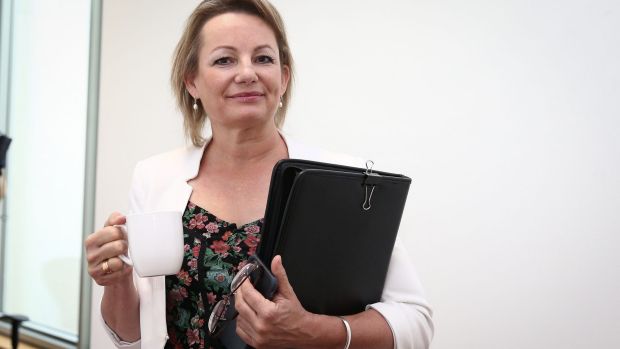
Health Minister Sussan Ley. Photo: Alex Ellinghausen
Little more than a week after its second budget, the Abbott government has made its first strategic retreat by abandoning a plan to increase charges for subsidised medicines.
The backdown will blow a $1 billion hole in the budget.
Speaking to reporters in Melbourne on Thursday, Health Minister Sussan Ley acknowledged the proposal to increase the amount patients must spend on drugs before qualifying for relief under the Pharmaceutical Benefits Scheme safety net would not pass the Senate.
The proposal is part of a bill that would also increase the patient contribution for PBS drugs by $5 a script for general patients, and by 80¢ a script for concessional patients.
“That measure is not going to pass the Parliament,” Ms Ley said.
“I have had conversations with the crossbench and they have indicated they are not going to support it.”
The shift follows a Fairfax Media report on Wednesday that some of Australia’s sickest people would pay more each year for their medicines under the little-noticed change.
Currently, after general patients spend $1453.90 in a year on PBS medicines, they get further scripts for the rest of that year for $6.10 each. Under the budget proposal, this threshold would be increased by 10 per cent each year for four years, in addition to indexation in line with the consumer price index, eventually adding several hundred dollars to the amount patients must spend before qualifying for relief.
The threshold for concessional patients, currently $366, would increase by two scripts each year for four years, so that by 2019 they would be paying for eight more prescriptions a year before qualifying for free scripts.
Consumers Health Forum chief executive officer Leanne Wells said the proposals to make patients pay more for drugs were “a concern for consumers, particularly the chronically ill,” and were at odds with the government’s stated desire to improve care for people with chronic conditions.
Only last Wednesday, Treasurer Joe Hockey reaffirmed the government’s commitment to the measure, which originally appeared in the 2014 budget, when he gave the traditional post-budget address to journalists.
But on Monday, Ms Ley distanced herself from the proposal to increase PBS patient contributions, describing it as “a separate measure I inherited from the last budget”, and stressing other measures to make medicines cheaper, including giving pharmacies the option of discounting the patient contribution by $1, would not be contingent upon the proposal.
On Thursday, Ms Ley conceded the changes could not get through the upper house and cut her losses.
“I am not going to waste time putting things through the Parliament that are going to be voted down by my colleagues,” she said.
With Labor and the Greens firmly opposed to the changes, the government would have needed the support of six of the remaining eight crossbenchers to secure the bill’s passage through the Senate.
Ms Ley’s pragmatic move echoes her decision to dump the unpopular Medicare copayment proposals bequeathed to her by Prime Minister Tony Abbott and her predecessor as health minister, Peter Dutton.
In jettisoning the PBS measures, Ms Ley forgoes savings worth more than $1 billion over four years.
In recent weeks Ms Ley has been negotiating with pharmacists and drug manufacturers about alternative savings to offset the cost of subsidising new drugs.
“We understand that we have to balance the books,” Ms Ley said on Thursday.
She has previously estimated giving pharmacists the option of discounting the patient contribution by $1 a script would save the budget $360 million over five years due to fewer people qualifying for relief under the PBS safety net. However the decision not to push ahead with increasing safety net thresholds is likely to significantly shrink this saving.
Other savings under consideration include removing over the counter medications such as paracetamol from the PBS and speeding up the process by which the prices the government pays pharmacists for drugs are brought into line with market prices.
Ms Ley said on Thursday she was having “a very constructive conversation” with crossbench senators about how the nation could make new drugs affordable.
